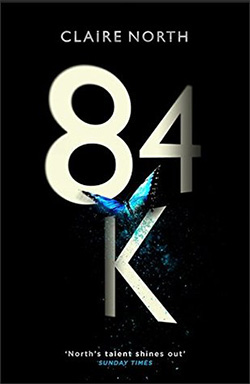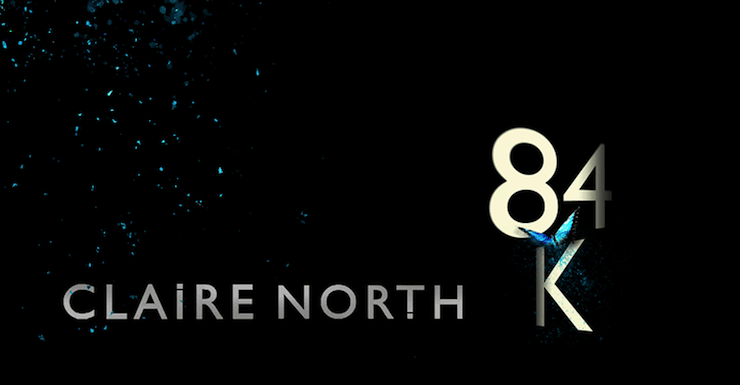Having dealt so memorably with death in The End of the Day, Claire North sets her sights on life in 84K, a powerful and provocative novel that nods to George Orwell at the same time as narrating a tale not even he could tell so well. It’s not an easy read—not that you’d take Nineteen Eighty-Four to the beach either—but buckle up, because what it is is brilliant.
At the core of North’s newest is a question oft-asked yet rarely answered to anyone’s satisfaction: can you possibly put a price on something as sacred as life? In 84K you absolutely can. You can put a price on the taking of life, and come up with numbers that basically negate any other crimes you’ve committed—and that’s exactly what the man called Theo Miller does on a daily basis.
Theo—though that’s not his real name—works for the Criminal Audit Office, which “emerged some seven or so years before human rights were judged passé” and utterly disrupted a justice system that just didn’t work, according to the Company. Prison, as its inordinately influential opponents put it, “was a deeply inefficient way of rehabilitating criminals, especially given how many were clearly irredeemable, and despite privatisation efficiencies overcrowding and reoffending were a perennial problem.” Better, the alarming argument went, to assign fines to each and every illegal act, and pack off any lawbreakers who are unable to pay their way to so-called Commercial Reform Institutes, which is to say work camps where the poor can at least be trusted to be productive.
Chilling, isn’t it?
Buy the Book


84K
That’s a sense that sets in early on in 84K, like a presentiment of imminent sickness, and it doesn’t let up in the least, even as North’s novel barrels back and forth between three threads that, though they represent a through-line for Theo, are likely to rebuff some readers. In the first, chronologically speaking, he gets a name and an education, if not necessarily in that order. At Oxford he makes a friend who makes an enemy whose actions open a door to a life that Theo, so long singled out because of his father’s scandalous past, leaps into without thinking.
His dubious decision comes back to bite him in the story’s foremost fragments, which follow Theo as an assessor in the aforementioned Audit Office some years later, where his day-to-day involves issuing penalties to be paid by criminals of every creed. He’s been living a quiet life since seizing his ill-fated friend’s identity, and initially, his resolute refusal to rock the boat extends to the increasingly desperate requests of Dani, a childhood sweetheart who wants him to help her find her daughter.
Theo unwillingly accedes when she threatens to expose him for who he isn’t, but no sooner has he gotten involved than Dani turns up dead—murdered, for that matter. Even then, it’s only when her murder case lands on his desk for assessment that Theo finally realises that “he had been selling slaves for the last nine years, and he knew it but somehow managed not to understand that this was his profession.”
There aren’t any chains on our feet or beatings on our backs because there don’t need to be. Cos if you don’t play along with what the Company wants, you die. You die cos you can’t pay for the doctor to treat you. You die cos the police won’t come without insurance. Cos the fire brigade doesn’t cover your area, cos you can’t get a job, cos you can’t buy the food, cos the water stopped, cos there was no light at night…
84K’s last chapters are a sort of startling seasoning on the story, sprinkled as they are all over the whole. From the fiction’s first lines, in fact, we find Theo at death’s door, apparently in the aftermath of some sort of conflict. A lonely narrowboat owner named Neila takes him in, however, and as she nurses him back to health, gradually gains his trust.
Trust, of course, is a hard thing to come by in a Claire North novel, as fans of her previous texts will attest, and 84K is a Claire North novel in every sense. From its slippery treatment of time to its stream-of-consciousness storytelling style, it may actually be the most Claire North novel of all Claire North’s novels, and nowhere is that more apparent than in its challenging central character:
It wasn’t that he was inept, or even disliked. There wasn’t enough personality in Theo Miller for people to love or hate. A psychic had once attempted to read his aura, and after a period of frowning so intense she started groaning with the effort of her grimace, announced that it was puce. Like everyone else from the mystic to the mundane, she too had failed to spot that his life was a lie, or that the real Theo Miller was fifteen years dead, buried in an unmarked grave. So much for the interconnected mysteries of the universe, Theo thought. So much for all that.
Theo is not a natural protagonist in any of his various incarnations, and I don’t just mean that he’s hard to like. He is that, but the issue—and it certainly will be an issue for some—is that he’s an empty shell of a person. North, needless to say, knows this, and knows too, to be sure, that clinical characterisation is not going to make what is already a demanding narrative any more accessible.
That she’s got something significant to say is plain as day. That it’s something she values more highly than appealing to new readers is at least as clear, and whilst that’s problematic on the one hand—not least because 84K is exceptional enough that it deserves a rousing reception—on the other, I can’t help but admire North as an author for exhibiting the courage of her convictions.
As to what this thing she’s staked her new novel on is… well, I’m not going to tell. What I will say is that both stylistically and structurally, North goes out of her way in 84K to stress the disconnectedness of her new world. In this future—a future that is not so far removed from our own as we might like to tell ourselves—people have become disconnected from one another, and some, such as Theo, have become disconnected from themselves, from their own thoughts and feelings and ambitions and beliefs.
That disconnection is evident in North’s naturalistic portrayal of Theo’s thought process, which sees sentences bump into and interrupt one another on the page just as they must in his head. It’s also on display in the scattershot nature of the narrative. As we’re thrust from one time to another, back and forth, hither and yon, that disconnection becomes something not merely read but felt, and that—that and not Theo or Dani or her daughter, nor the poor student whose name Theo thieved, nor sweet Neila on the narrowboat, nor the Criminal Audit Office or the Company or even the bloody country—that disconnection is ultimately what 84K is all about. It’s a brutal but truthful book about losing touch with what matters most, and maybe, just maybe, finding it again.
84K is available from Orbit.
Niall Alexander is an extra-curricular English teacher who reads and writes about all things weird and wonderful for The Speculative Scotsman, Strange Horizons, and Tor.com. He lives with about a bazillion books, his better half and a certain sleekit wee beastie in the central belt of bonnie Scotland.










